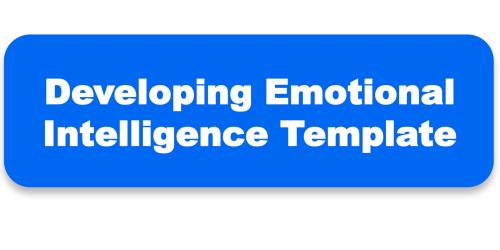Emotional Intelligence is the ability to create a balance between knowing what you don’t know and that what you do know can be improved. It also means you have the ability to see the same knowledge and balance in others; teaching them how to be aware and create a good balance for themselves.
In the workplace, Emotional intelligence will help you grow personally and professionally by developing it in yourself and teaching it to those around you.
Here is a template you can use develop your skills and facilitate the discussion with your team.
Developing Emotional Intelligence In Yourself & Your Team - FREE Download

Why Is This Important To You?
-
When you are emotionally aware you become free to grow personally and professionally. You learn to take everything in and separate the good from the bad…accepting the good and being unaffected by the bad.
-
An emotionally intelligent individual is not offended by the judgments of others. They can see past them as they try to find the benefit, if any, that they can use to grow and improve. If there isn’t any benefit, they have the ability to move on, unaffected.
-
Emotional Intelligence allows you to develop social skills that help you build constructive relationships.
-
You learn to communicate with respect at the forefront of every discussion and make others feel at ease: it’s not about you, make it about them.
-
Your opinion matters to others. You become an unbiased authority, someone that can be trusted; someone that eases the insecurities of others. This is why successful leaders are known to exhibit a high degree of emotional intelligence. It is a skill that gets people to follow you.
Developing Your Own Emotional Intelligence
Knowing What You Don’t Know
It is impossible to know everything. Everyday is a learning experience. Everyone has something they can teach you from their own experience or perspective. We can all agree that these statements are true. But do you act in a way that allows you to learn new things? Or do you act as though your way is always right? Equally important is to ask: do the people you interact with (your boss, your employees, your co-workers) believe that you are actively learning from them?
Actions You Can Take to Develop This Skill:
-
Seek knowledge and opinions from others.
-
Utilize active listening skills by really paying attention to the words, actions & ideas of others. Your goal is to understand, not just hear and see.
-
Make an effort to understand every situation from all angles. Never take anything at face value, instead, take the time to find out what is really going on, including the motives that caused others to say or act on something.
-
Support others who are more knowledgeable than you. Create a circle of knowledgeable people and give them credit for their ideas.
Know That What You Do Know Can Be Improved
It is important to acknowledge your own accomplishments; have confidence in your work, your ideas and your abilities. One very important aspect of your confidence level is knowing that you have the ability to improve, develop and expand on what you know.
-
Your ability to continuously self-improve keeps you relevant and builds your confidence level.
-
When you are confident you can thoughtfully decipher between ideas that will improve upon your current knowledge vs. those that are not relevant…most importantly, the process you use to decipher this allows you to explain why an idea works or doesn’t.
Actions You Can Take to Develop This Skill:
-
Communicate to be understood, modifying your approach for the benefit of your audience. Their understanding & acting on your words is more important than you speaking your mind.
-
Ask for opinions on your work, and answer questions with an awareness that questions may be good indicators of the effectiveness OR ineffectiveness of your message.
-
Speak with confidence, authority & passion regarding your subject matter, not yourself: be humble and write down any suggestions your audience makes whether you decide to use their suggestions or not.
-
Reflect on your day and your decisions. Give yourself 5 minutes of fame to celebrate your accomplishments and then move on, seeking to learn from your mistakes and the input of others.
Teaching Emotional Intelligence to Others
Emotional Awareness is not an innate quality, or at least is doesn’t have to be. As a leader or manager, having emotionally intelligent employees is an incredible asset to your organization and to achieving your goals. It is your job to set the expectation for this quality in your team. Here are 3 steps you can take to teach Emotional Intelligence to you team:
-
Set an example for emotional intelligence by developing it yourself. Use this article as an actionable template for your success; your employees will notice your actions and follow your lead.
-
Spell out your expectation that each of your employees develops this skill for the benefit of the team and the company.
-
Follow up with each employee individually.
As a manager or leader it is important to accept others for who they are, assess what they are good at and help them to develop those strengths into something valuable to the organization. We challenge to use Emotional Intelligence as a means of developing your staff. Imagine the impact of respectful, knowledgeable employees that focus on humility, active listening, continuous self-improvement & sharing ideas. Is that how you would describe your team today?
Developing Emotional Intelligence takes time and effort, but over time the assessment process will become intuitive. It is easy to get started. Take the challenge and raise the bar for yourself & your team. It will benefit your business, and carry over to positively impact each individual in his or her private life.